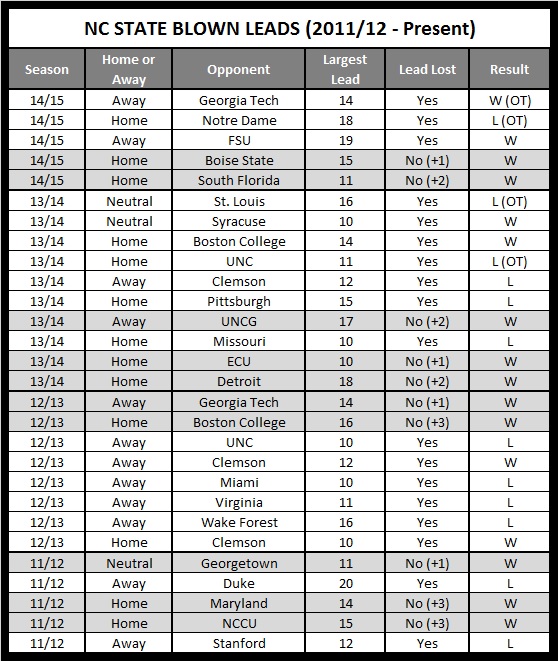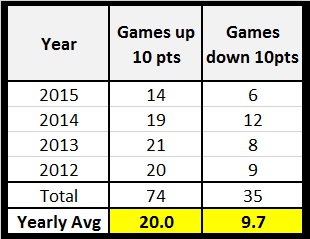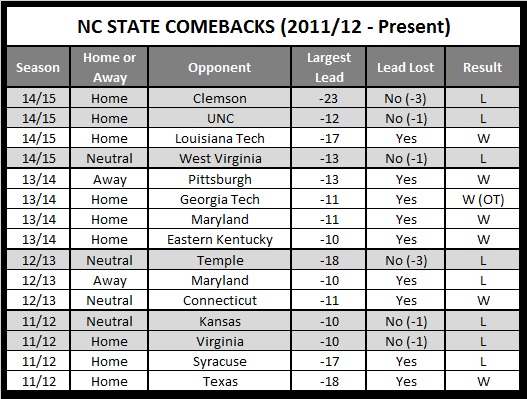If you think blown leads and huge deficits don’t anger fans then you haven’t been following the Pack this season. Just take a look at the fiascoes over the past couple of weeks if you don’t believe me. I don’t know about some of you but it sure does feel like State teams coached by Gottfried give up a lot of leads. I actually mentioned this during a post game discussion earlier in the season and a commenter said prove it, stop being anecdotal. Well after the Notre Dame Choke job I decided it’s high time I dig deeper, find the facts and see if this feeling is accurate. Without further ado let’s get started.
The first thing I had to do was decide, how much constitutes a “lead”? I decided to put a “Lead” at 10 points. Anything less than double digits doesn’t seem insurmountable during the course of a game. So I looked at all games where the lead stretched out to 10 points by either team. Then I decided not to look at games where the losing team didn’t make a legitimate case of overcoming the lead, so I decided the lead had to go from at least 10 points down to 3 points or less (1 possession away from tying the game). This eliminates all games where (1) the lead never stretched to 10 points and (2) the lead stretched to 10 points but the losing team never reduced the lead to one possession. First let’s look at NC State “blowing a lead”:

If you’d like to see the times when the leads were built and when they were erased click here
As you can see blowing leads has happened quite a few times in the 3.5 years Mark Gottfried has been coaching the Wolfpack, 18 times to be precise, 28 if you count allowing a team to come back to within 1 possession. As you can see in the table they have a record of 6-12 (.333) when they completely lose a 10 point (or more) lead. In the 131 games Gottfried has coached at NC State (through the GT game) his teams have “Blown A Lead” 14% of the time, 21% of the time they’ve allowed a team to come back to within 1 possession.
Here are the total number of games each season the Pack was either up or down by 10 or more points first:

Over 1/2 of the games the Pack will get a 10 point or greater lead first while 1/4 of their games they will fall behind by 10 or more points first. The remaining 25% of games will be so close no one will take a lead greater than 9 points.
If you compare only the times the Pack has been up by 10pts or more and lost the lead to just the games they were up by that amount (not the 131 games under Gottfried) then the blown leads increases to 24%. That’s almost 1 out of ever 4 games the Pack will get at least a 10 point lead and then completely blow it. If you add in the down to 1 possession it happens 38% of the time, over 1 out of every 3 times. I don’t know about you guys but neither of those numbers look good to me.
The biggest blown lead happened at Duke in 11/12 where the Pack had a 20 point lead with 11 minutes remaining and over the next 9 minutes gave it completely away and lost the game. Numbers 2 and 3 on the list happened this season against FSU and Notre Dame respectively. While State was able to walk away with a victory against FSU they couldn’t against Notre Dame. I hope this helps some people see why so many fans are as upset over that loss as they have been.
You can see it doesn’t matter where it’s happened: Home (2-4), Away (3-7), Neutral (1-1), it’s happening and they are more likely to lose the game away from Raleigh when it does happen. It happens against BIG SCHOOLS, little schools, and everyone in between. The thing is it happens. Look all teams make a run, that’s basketball; it’s how you handle it that separates the good programs from the Bubblicious ones. Frankly though this is maddening the way Gottfried’s State teams can be so good yet so bad at the same time. Yes we are looking at this in a vacuum, I don’t know how other coaches have done in this time period and I don’t know how MG did back at Alabama but this does appear on the surface to happen and happen often enough to be of concern.
Now that we’ve looked at the bad news let’s flip the coin and see the good…Comebacks.

EDIT: The comeback against Texas was at neutral site and will fix later.
If you’d like to see the times when the leads were built and when they were erased click here
The 2 things that jump out to me are (1) Comebacks don’t happen very often and (2) it almost always at home. The Pack has only come completely back in 9 games (7-2) with another 6 games where they got it to within 1 possession but couldn’t close the deal. As I said it almost always happens at home (4-1) and only twice at an opponent’s place. Gottfried’s teams at State are twice as likely to blow a lead as they are to come from behind.
If you compare only the times the Pack has been down by 10pts or more and came back for the win to just the games they were down by that amount it’s 26%. So 1 out of ever 4 games the Pack is down by 10 or more points they will overcome it. If you add in the down to 1 possession it happens 43% of the time, almost half the time but it won’t be on the road.
The biggest comeback was at a neutral site (IZOD Center, East Rutherford, NJ) against Ricky Barnes and his Texas Longhorns when the Pack was down 18 with just under 12 minutes left in the game and in just 5.5 minutes State erased that lead and eventually won. The second biggest comeback that resulted in a win was this season against Louisiana Tech. As you can see most of these games are against bigger named schools but there are a few in the list that shouldn’t ever happen.
I’d love to know how other coaches are doing to get a good comparison on how Gottfried compares to others but that’s just not going to happen. We’ll just have to settle for knowing Gottfried has the ability to coach his teams well enough to get leads in over half their games but struggle to hold on to it. Imagine the difference in record and NCAA Tournament seeding State would have if they could just cut those blown leads in half?? This is all just food for thought the next time you’re watching the Pack and the lead stretches out to 10 or more points for one team and you’re considering the likely outcome of the game.



